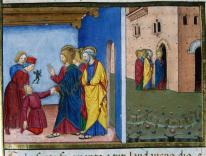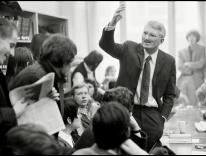UNFAIR ADVANTAGE
I am not a member of the United Auto Workers, or a holder of GM stocks or bonds, or a hedge-fund manager in Greenwich, Connecticut. So I approached Nick Baumann's article (“Rules of the Road,” July 17) without any obvious bias. Baumann begins by agreeing with critics of the Chrysler reorganization plan that bondholders are not being treated fairly. He goes on to argue that this is because the point of the bailout is to save jobs, not “preserve the value of the investors' bonds.” If he had left it at that, the article might have had more appeal, but Baumann seems unable to resist turning the situation into a David-and-Goliath scenario: “tens of thousands of middle-class people in the upper Midwest” versus “the fortunes of hedge-fund managers in Greenwich.” In doing so he misrepresents the situation.
Baumann says he finds it “hard to have much sympathy for” the state pension fund of Indiana, a stakeholder trying to ensure that its bonds would be “worth something.” He suggests that groups like the pension fund stuck with Chrysler because they would be able to “bully” President Barack Obama into “giving them a good deal” on their bonds. But clearly the group most able to “bully” the Obama government was and is the UAW that supported his candidacy during the campaign with volunteers and financial contributions. In this political arena, the UAW carries the big stick, not the bondholders. Most important, Baumann seems to forget that the owners of the Indiana pension fund are union workers, the same as those working at GM, many of whom have also suffered layoffs, wage freezes, and forced furloughs. They are, in fact, middle-class people, like me. Does Baumann really think it's right to change normal bankruptcy procedures to protect someone else rather than me?
Kathleen Martin
Spring Valley, Ill.
THE AUTHOR REPLIES:
Kathleen Martin and I don't disagree on much. First, I did not intend to suggest that this situation actually pits “middle-class people in the upper Midwest” against hedge-fund managers. As I acknowledged by mentioning the pension funds, the bondholders are more diverse than that. But the Republicans' strategy of demonizing the union—rather than questioning the bailout itself—allowed President Obama to paint that stark “ordinary folks vs. bankers” picture.
Like Martin, I recognize that the UAW, not the bondholders, has the leverage in the automaker bankruptcies. I wrote that bondholders thought they could bully the Obama administration—not that they were right. Their wrongness only underlines the fact that pension funds and other bondholders were taking an obvious risk by holding automakers' bonds in late 2008 and early '09. It's not the automakers or the administration that Martin should be questioning; it's those investors who thought they held all the cards when they really held none. There was a time when public pension funds invested the vast majority of their money in Treasury bills and other “safe” instruments. But over the past few decades, pension-fund managers and politicians decided to start gambling with the money entrusted to them. Many of them took bribes in exchange for directing pension-fund money to specific investments. Those people should be held accountable for the funds' bad investments—not a union doing its duty to get the best deal possible for its workers.
Nick Baumann
CUBAN SANCTIONS
Patrick F. Morris and I are both old Latin America hands. Over the years, we have often agreed. But in the case of his response (“Letters,” June 19) to my article “Temperate Zone” (May 22), we do not. He claims a pivotal role for the 1963 Organization of American States (OAS) resolution introduced by Venezuela, calling for all member countries to impose economic and diplomatic sanctions on Cuba. I, on the other hand, see that resolution as little more than embellishment designed to give a multilateral façade to a unilateral policy. Morris accepts the claim that in 1963 “a large arms cache of Cuban origin” was found on a Venezuelan beach. I do not. Similar arms caches of supposed Cuban origin were discovered in the Dominican Republic and Nicaragua when U.S. involvement in those countries was under intense international scrutiny. With the undoubted capacity to deliver arms directly to the Venezuelan insurgents, it would have made no sense for Cuba to have left valuable cargo on a beach where it could be found by government forces.
Cuba before 1959 was an economic colony of the United States. Its tariff schedule was fixed and maintained by the Department of State. By 1961, the United States had put in place all the measures it believed necessary to strangle the Cuban economy. To our chagrin, Canada, Mexico, and Spain saw the U.S. trade embargo as both an economic and political opportunity. Those countries took over much of the trade formerly carried on by the United States. Thanks to Soviet subsidies, Castro could pay for those imports.
Fourteen out of twenty-one members signed the 1962 resolution suspending Cuba's membership in the OAS. The 1963 OAS resolution calling for diplomatic and economic sanctions succeeded in adding only one state, Venezuela, to that bare majority. From that outcome I conclude that Venezuela's then-President Rómulo Betancourt bowed to Washington pressure and introduced the sanctions resolution into the OAS, but then made no effort to seek additional support from other governments in the hemisphere.
Robert E. White
Alexandria, Va.


